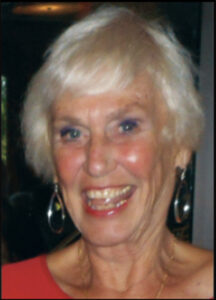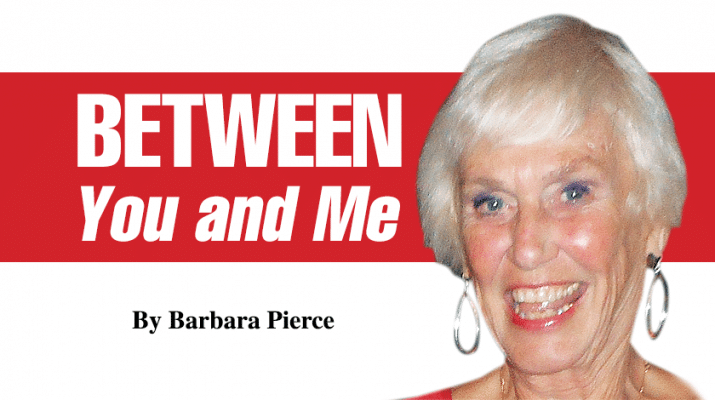By Barbara Pierce
 “I give myself a ‘D’ on how I handled that situation with my son. Maybe I even an ‘F!’” said my friend Sally between bites of our pizza lunch.
“I give myself a ‘D’ on how I handled that situation with my son. Maybe I even an ‘F!’” said my friend Sally between bites of our pizza lunch.
“She’s been out of school for over 40 years,” I thought to myself. “Why is she still grading herself? And why is she talking so critically about herself?”
I liked my lunches with Sally, but I didn’t like to hear the way she talked about herself so critically!
As our lunch was ending, the pizza nearly gone, Sally said “I was a bad mother. My kids don’t like me; they feel like I was never there for them.”
I felt sad to hear this horribly disparaging way she talked about herself. She never seems to have anything good to say about herself.
The words we use when we talk to ourselves or others are important; they directly influence us. The frequent self-criticism and negative self-talk that Sally does grinds down her self-esteem. As it tends to focus on mistakes and flaws — and disregards her strengths, accomplishments and efforts. It seriously harms her self-esteem and self-confidence.
“Self-esteem:” It’s not a real thing, though all of us have it. It’s an abstract concept. And that’s a good thing. It’s a good thing because that means that it can be changed.
Self-esteem is the way we talk to ourselves about ourselves. That’s all it is. If you say things like Sally does, you’re putting yourself down as you talk to yourself. You’re eroding your self-esteem.
If you find yourself saying things like Sally does or things like: “I’m not going to try that new class; it sounds too hard,” or “I won’t talk to the new guy at work; he’d never be interested in me,” or “I didn’t say anything in the meeting because what I thought wasn’t important,” you’re putting yourself down. You may have low self-esteem.
Other things that show you may have low self-esteem are characteristics like unwillingness to try anything new, inability to say no, avoiding others, indecisiveness, needing to be liked by others, even depression.
How we think about ourselves was shaped in childhood, usually by our parents. Sally was probably a bright little kid, asking complex questions that baffled her parents and teachers. I suspect that hardly ever did this difficult kid get any positive feedback from the adults in her life. No one told her that she was OK, she was bright, she was competent.
“How could anyone ever tell you that you’re anything less than beautiful?” is a song that brings tears to my eyes every time I hear it. “How could anyone ever tell you that you’re less than whole?” No one ever told Sally. They only let her know she was difficult.
By adulthood, the way we think about ourself becomes our belief system — and beliefs can be hard to change. But they can change.
“To be a great champion, you must believe that you’re the best,” said the boxing great Muhammad Ali. “If you’re not, pretend you are.”
He had that right. To accomplish any undertaking, you must believe in yourself. If you don’t believe in yourself, pretend you do, talk yourself through it.
Since self-esteem is how you talk to yourself in your head, you can change your self-esteem by changing the way you talk to yourself.
Changing just a few of the words we use can make a big difference in our mood, our feelings, our relationships and our actions. When we change our words, we change our state of mind. Our words do shape our moods, our feelings, our actions and our relationships.
Become aware of how you talk to yourself and others. Change your language, change your life: Subtle shifts in the words you use do make a world of difference.
What’s helped me was to think of what I would tell a friend if I heard her say the things I was saying to myself. “Maybe you didn’t handle this situation so well, but you’ve handled a lot of other complicated situations very well.”
Or I’d tell Sally, “Maybe you made some mistakes with your kids, but didn’t we all? Overall, they seem pretty together!” And: “Don’t say you were a total failure as a mother. Instead, say: I did some things right and some things wrong.”
Look at whether you’re using absolute words. Absolute words only see one extreme or the other — black or white, right or wrong. Words such as always, never, everyone, no one, failure, right, wrong, bad, good are absolute words.
When you’re using these words, you’re not considering any middle ground. Try to replace absolute, black or white words with words like these: often, sometime, several, many, better, worse.
If you’re struggling with self-esteem or all-or-nothing thinking, you may want to see a therapist. Cognitive behavioral herapy may help, as it aims to teach people how to take control of how they interpret and deal with situations.
 Barbara Pierce is a retired licensed clinical social worker with many years of experience helping people. If you would like to purchase a copy of her book, “When You Come to the Edge: Aging” or if you have questions for her, contact her at barbarapierce06@yahoo.com.
Barbara Pierce is a retired licensed clinical social worker with many years of experience helping people. If you would like to purchase a copy of her book, “When You Come to the Edge: Aging” or if you have questions for her, contact her at barbarapierce06@yahoo.com.

